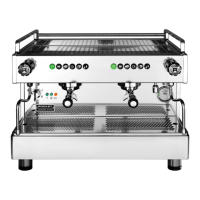_____________________________________________________________________________________________
© Rocket Espresso Ltd. Boxer series. User Manual Ed. 08.2015. Specifications subject to change without notice.. Page 13
Dispensing steam to froth or heat up liquids
1. Fill a suitable ideally stainless steel pitcher (used for food only) with an
insulated grip with the liquid to be heated up or frothed.
2. Position the steam nozzle of the steam wand (Fig. 1-4) just below the
surface of the liquid inside the liquid in the recipient. To avoid personal
injury always ensure that the end nozzle of the steam wand (Fig. 1-4) is
below the surface of the liquid to be steamed.
3. Turn on steam valve (Fig. 1-2).
4. Heat up or froth the liquid inside the pitcher. Pay attention to hot sprays!
They may cause injuries.
5. When you’re done, close the steam valve (Fig. 1-2).
6. Clean the steam wand (Fig. 1-4) and the steam wand’s end nozzle carefully
with a non abrasive clean damp cloth after each single use without touching
it directly with any part of the body to avoid injury or damage due to the hot
surface of steam wand end nozzle. Caution: Hot surface.
Example: Steaming milk
1. Use a clean, cold pitcher and fill 1/3 with cold, fresh milk.
If milk has previously been steamed and stored in the refrigerator, we
suggest adding some fresh milk in order to achieve optimum foam. Milk
should be stored at a temperature around 4-5°C (app. 40°F).
2. Insert steam wand’s (Fig. 1-4) nozzle into the centre milk just below the
surface of the milk.
3. Open steam valve (Fig. 1-2) rapidly.
4. Steam will come out of the nozzle and froth the milk. The milk volume will
increase rapidly. Please lift the pitcher progressively to make sure that
the steam nozzle is always right below the surface of the milk.
5. When enough foam is achieved, submerge nozzle (going sidewise) and keep
it in that position finishing heating milk until the pitcher is too warm to
touch.
Please remember that milk should never be steamed over app. 76°C
(168°F). Milk steamed to over this temperature is scalded.
6. Close steam valve (Fig. 1-2) rapidly, then remove milk pitcher from steam
wand.
7. Wipe the steam wand (Fig. 1-4) immediately after using with a non
abrasive clean damp towel without touching the steam wand (Fig. 1-4)
directly with any part of the body to avoid injury or damage due to the
hot surface of steam wand and end nozzle. Use a towel that is
designated for the steam wand only. Do not cross contaminate
kitchen towels by using the same towel for cleaning the steam wand
and i.e. kitchen tops.
Do not let the milk bake onto the steam wand. Clogged wands and steam
valves can be expensive to repair or to replace.

